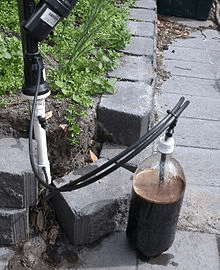Ferti Irrigation (Fertigation) - Scheduling of Irrigation and Fertilizers, Crop Production | Crop Production Notes- Agricultural Engineering PDF Download
Fertigation is the injection of fertilizers, soil amendments, and other water-soluble products into an irrigation system.


Fertigation is related to chemigation, the injection of chemicals into an irrigation system. The two terms are sometimes used interchangeably however chemigation is generally a more controlled and regulated process due to the nature of the chemicals used. Chemigation often involves pesticides, herbicides, and fungicides, some of which pose health threat to humans, animals, and the environment.
Uses
Fertigation is practiced extensively in commercial agriculture and horticulture. Fertigation is also increasingly being used for landscaping as dispenser units become more reliable and easier to use. Fertigation is used to add additional nutrients or to correct nutrient deficiencies detected in plant tissue analysis. It is usually practiced on high-value crops such as vegetables, turf, fruit trees, and ornamentals.
Advantages
The benefits of fertigation methods over conventional or drop-fertilizing methods include:
- Increased nutrient absorption by plants.
- Reduction of fertilizer, chemicals, and water needed.
- Reduced leaching of chemicals into the water supply.
- Reduced water consumption due to the plant's increased root mass's ability to trap and hold water.
- Application of nutrients can be controlled at the precise time and rate necessary.
- Minimized risk of the roots contracting soil borne diseases through the contaminated soil.
- Reduction of soil erosion issues as the nutrients are pumped through the water drip system. Leaching is decreased often through methods used to employ fertigation.
Disadvantages
- Concentration of the solution decreases as the fertilizer dissolves. This may lead to poor nutrient placement.
- The water supply for fertigation is to be kept separate from the domestic water supply to avoid contamination.
- Possible pressure loss in the main irrigation line.
- The process is dependent on the water supply's non-restriction by drought rationing.
FAQs on Ferti Irrigation (Fertigation) - Scheduling of Irrigation and Fertilizers, Crop Production - Crop Production Notes- Agricultural Engineering
| 1. What is fertigation and how does it work? |  |
| 2. Why is fertigation important in crop production? |  |
| 3. How can fertigation help in scheduling irrigation? |  |
| 4. What factors should be considered when scheduling fertigation? |  |
| 5. Are there any challenges or limitations associated with fertigation? |  |

|
Explore Courses for Agricultural Engineering exam
|

|
















